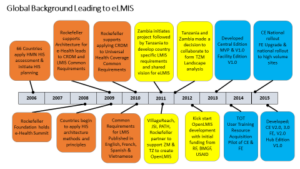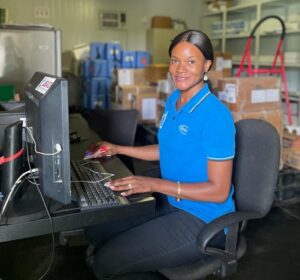In 2014, Zambia embarked on a groundbreaking venture with the introduction of the electronic Logistics Management Information System (eLMIS), revolutionizing the country’s healthcare landscape.
The Early Days

-
Pioneering Partnerships
In the early stages of eLMIS in November 2013, a collaborative effort involving 30 Ministry of Health (MOH) and Ministry of Community Development Mother and Child Health (MCDMCH) personnel marked the beginning of Zambia’s digital healthcare journey. Through the Central Edition (CE) Training of Trainers (TOT) sessions, these dedicated individuals laid the foundation for eLMIS’ implementation, sharing expertise and insights to ensure its effectiveness.
Following this, from April to May 2014, Facility Edition (FE) TOT sessions equipped 50 frontline healthcare workers with the knowledge and skills needed to navigate the system’s functionalities.
-
Trials and Triumphs:
By June 2014, the eLMIS Facility Edition entered its pilot phase, with 46 sites serving as testing grounds for the system’s capabilities. During this time, 200 healthcare workers were trained and hardware totaling USD $315,000 was procured, providing the necessary infrastructure for eLMIS’ tangible presence in Zambia’s healthcare system. This pivotal stage allowed stakeholders to gain firsthand experience with eLMIS and provided invaluable insights for further refinement. The subsequent assessment conducted in December 2014, involving 23 pilot sites, facilitated a comprehensive evaluation of the system’s performance, laying the groundwork for its national rollout.
-
Expansion and Empowerment:
With the successful completion of the pilot phase, January 2015 marked a significant milestone as eLMIS Central Edition was rolled out nationally. This expansion saw the system reaching key health facilities, including all District Community Medical Offices (DCMOs), Provincial Medical Offices (PMOs) and hospitals and 814 healthcare workers were trained.
As eLMIS continued to gain momentum, further progress was evident in the months that followed. By July and beyond, the system’s reach continued to grow, with a total of 714 health workers trained and additional hardware procurement totaling USD $2,000,000, solidifying eLMIS’ position as a cornerstone of Zambia’s healthcare infrastructure. The Facility Edition was rolled out nationally to 100 high-volume sites, empowering frontline healthcare workers with essential tools for streamlined pharmaceutical management.
Corrine Zulu’s Journey with eLMIS and the System’s Evolution Over the Years
 Corrine Zulu, a dedicated pharmacist and Sub-District Pharmacist for Mandevu Constituency, has been an integral part of this transformative journey since the system’s inception in 2014. Corrine shared her reflections on the past 10 years and the evolution of eLMIS in Zambia. Her insights shed light on the transformative impact of this system on pharmaceutical management and healthcare delivery in Zambia over the past decade.
Corrine Zulu, a dedicated pharmacist and Sub-District Pharmacist for Mandevu Constituency, has been an integral part of this transformative journey since the system’s inception in 2014. Corrine shared her reflections on the past 10 years and the evolution of eLMIS in Zambia. Her insights shed light on the transformative impact of this system on pharmaceutical management and healthcare delivery in Zambia over the past decade.
In the early days of eLMIS, Corrine was actively involved in testing the system before its official rollout. She provided valuable recommendations to align the system with existing processes, ensuring its effectiveness in managing pharmaceutical information. She expresses that she was happy with the introduction of the system as it streamlined her daily tasks, especially in terms of reporting and data availability.
-
System Enhancements
Over the years, Corrine witnessed significant evolution in the eLMIS system. She notes, “from manual input to auto-generated reports and seamless departmental transitions, the system has become more user-friendly and efficient. These enhancements have not only improved workflow integration but also contributed to cost savings and reduced stock expiries”.
-
Impact on Patient Care
In terms of patient care, Corrine emphasized the system’s role in ensuring the availability of essential medicines, particularly during critical times like the Covid-19 pandemic and Cholera outbreak. Corrine reflects, “eLMIS was invaluable in helping us manage the increased demand for essential medicines. By leveraging real-time data and trends, we could quickly identify stock imbalances, make informed decisions and take action to prevent stockouts, ensuring that patients received the care they needed.”
Training and Support
 Corrine shares that training and technical supervisory support have been crucial components of eLMIS implementation. She says, “While initial classroom sessions were conducted, the focus shifted to on-the-job training, empowering super users like myself to champion the system’s adoption and usage. Our user feedback has also played a vital role in system development, with our suggestions driving improvements to enhance usability and functionality.”
Corrine shares that training and technical supervisory support have been crucial components of eLMIS implementation. She says, “While initial classroom sessions were conducted, the focus shifted to on-the-job training, empowering super users like myself to champion the system’s adoption and usage. Our user feedback has also played a vital role in system development, with our suggestions driving improvements to enhance usability and functionality.”
Today and the Future
Today, the eLMIS FE has been deployed to over 1.600 health facilities across the country and over 5,400 health facility staff have been trained in eLMIS use. Looking ahead, Corrine envisions further integration of eLMIS into pharmacy training programs, ensuring that future pharmacists are well-equipped to leverage the system from the onset of their careers. She says, “by incorporating eLMIS into training programs, we can ensure a smooth transition for new healthcare professionals.” Her advice to newcomers echoes her own experience: embrace the system as a tool to reduce workload and enhance efficiency. She advises that, “the best way to learn how to use the system is to use it. So, accept it, use it, embrace it.”
Reflecting on the past decade, Corrine expresses gratitude to the USAID electronic Supply Chain Management Information System (eSCMIS) project team for their support to the Zambia Ministry of Health in improving and implementing eLMIS. She expresses, “their continuous efforts have not only enhanced health supply chain management but also healthcare delivery across Zambia. As Corrine looks to the future, she remains optimistic about the continued impact of eLMIS on healthcare in the country.
